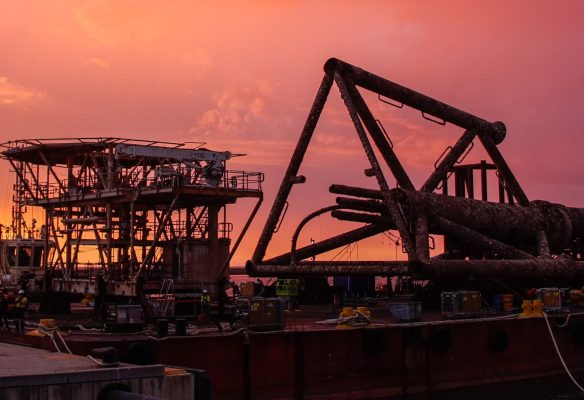Liberty Industrial was engaged by our client to remediate a 4200m2 containment cell in the Central Coast region of NSW. The Newcastle Disease event of 1999 resulted in the emergency burial of 10,000m3 of affected poultry shed litter and contents into a purpose-built cell. The area selected for the cell was a former swine farm, with surrounding poultry sheds and bounded on the northern side by a major water catchment. Since 2007 groundwater monitoring wells down the gradient of the cell, have identified elevated levels of nitrates and ammonia. Leachate from within the cell was regularly pumped from the cell and carted off-site for disposal. The surface of the cell had minor depressions where subsidence has affected the capping material. This location was recently impacted by multiple instances of greater than expected rainfall in the form of record downpours over a short space of time. This required the waste cell to be remediated without interacting with the buried biological waste material but re-capping and relining to ensure the longevity of the encapsulation. Re-capping was agreed that it would significantly improve the performance of the existing cap. WSP has reviewed the existing cap. The package of required works included construction of an access road (completed with biosecurity controls), via an agreed easement with local landowners, soil remediation, surface water and groundwater monitoring and eventually resulted in the re-capping of the waste cell. Prior to commencing the waste cell re-capping, Liberty Industrial, in conjunction with a specialist biosecurity consultant, developed a strict biosecurity plan and controls as part of the overall project HSEQ management system. Post-project, biosecurity controls was removed and physical separation from the capped cell surface, was maintained via the installation of new fencing and gating, as agreed with stakeholders.
Robust solutions
- Worked collaboratively with all project stakeholders and developed a feasible and safe site set-up and proceeding that enabled all works to continue safely, whilst remaining focused on managing and mitigating environmental and biosecurity risks.
- Worked closely and communicated effectively with client representatives and neighbouring landowners to ensure they were not adversely impacted by the project works, including holding weekly stakeholder planning meetings and demonstrating a flexible approach to ensure stakeholders’ farm operations were not obstructed throughout the whole life of the project.
- Worked in coordination with the client and designers, to develop alternative methods of construction which enabled project scope such as access road construction, to continue without site shutdown, minimising potential delays.
- Conducted trial trenches and consulting with geotechnical engineers to develop safe, productive and efficient perimeter trench construction techniques, prior to implementing the final trench design. This included procuring specialised equipment when required and ensuring all involved had a complete understanding of the deliverable, prior to breaking ground.
Exceptional outcomes
Liberty Industrial has successfully delivered excellent outcomes for all stakeholders. Our ability to adapt to unforeseen site conditions whilst adhering to strict biosecurity controls at all times enabled the delivery and completion of the project in July 2023.











